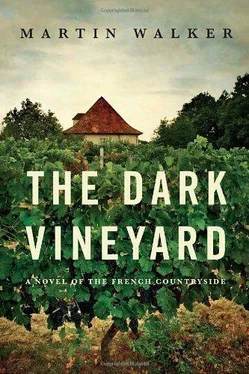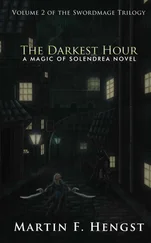Martin Walker - The dark vineyard
Здесь есть возможность читать онлайн «Martin Walker - The dark vineyard» весь текст электронной книги совершенно бесплатно (целиком полную версию без сокращений). В некоторых случаях можно слушать аудио, скачать через торрент в формате fb2 и присутствует краткое содержание. Жанр: Полицейский детектив, на английском языке. Описание произведения, (предисловие) а так же отзывы посетителей доступны на портале библиотеки ЛибКат.
- Название:The dark vineyard
- Автор:
- Жанр:
- Год:неизвестен
- ISBN:нет данных
- Рейтинг книги:5 / 5. Голосов: 1
-
Избранное:Добавить в избранное
- Отзывы:
-
Ваша оценка:
- 100
- 1
- 2
- 3
- 4
- 5
The dark vineyard: краткое содержание, описание и аннотация
Предлагаем к чтению аннотацию, описание, краткое содержание или предисловие (зависит от того, что написал сам автор книги «The dark vineyard»). Если вы не нашли необходимую информацию о книге — напишите в комментариях, мы постараемся отыскать её.
The dark vineyard — читать онлайн бесплатно полную книгу (весь текст) целиком
Ниже представлен текст книги, разбитый по страницам. Система сохранения места последней прочитанной страницы, позволяет с удобством читать онлайн бесплатно книгу «The dark vineyard», без необходимости каждый раз заново искать на чём Вы остановились. Поставьте закладку, и сможете в любой момент перейти на страницу, на которой закончили чтение.
Интервал:
Закладка:
“France and Italy are the homes of great wine, and our ambition will not be satisfied until we return to the source of our craft in these great countries,” Bondino was quoted as saying. His son Fernando had added: “And frankly, the wine industry in these countries is suffering from too many small vineyards overproducing too much indifferent wine. They have not yet followed the United States and Australia into a rationalization of the industry with new techniques and modern marketing. Opportunities for reorganization are enormous.”
Bruno read on in Marianne about a family feud that had split the business a generation earlier, with prolonged lawsuits and much bad blood, and a brother and sister disinherited. Les Echos had a story about the company’s buying new vineyards in South Africa the previous year, along with some figures that startled Bruno. Bondino had turned down an offer to sell the company for six hundred million euros; he had nearly three thousand employees worldwide-roughly the population of Saint-Denis-and had made a profit the previous year of thirty-eight million euros. Marveling at the amount of instant information that the computer brought to his desk, Bruno printed out the story from Les Echos and prepared a small dossier of his research for the mayor, while wondering what exactly a firm so large might want from his little town. He turned to his telephone and called Saint-Denis’s own expert on the wine trade, Hubert de Montignac.
“Bruno, my friend. I’ve put aside a fine bottle for you to show my appreciation for your tact and good sense,” Hubert began as soon as he heard Bruno’s voice. “Really, I owe you a big favor.”
“Just doing my duty. Listen, what can you tell me about an American wine corporation called Bondino?”
“Bondino is very big, up there close to Gallo and Mondavi among the American giants. Worldwide operations-Australia and South Africa-and there was a rumor that they’re sniffing around one of the big Bordeaux chateaux. They make their money with mass wines they call varietals.”
“What are varietals?”
“It’s just the name of a grape, like chardonnay or cabernet sauvignon, with each brand made from a particular grape. It’s mass production, trying to make exactly the same product year after year, whatever the weather and terrain. Why are you asking about Bondino?”
“He’s coming in to see the mayor. That’s all we know, so I thought I’d call you. What would Bondino Wines want with us?”
“Could be a number of things. They don’t have much of an operation in Europe, and it might not be a bad idea for them to look around here. As you know, we used to be a big wine area before the phylloxera epidemic, and then we started growing tobacco instead. Now the tobacco trade is dying, so land is pretty cheap. There’s no appellation controlee in this valley to drive up the price. Funny you should mention this, because that guy who dropped the bottle, Dupuy, was asking me about wine and land prices around here just after you left. I let him try a glass of that stuff the Domaine produces; it’s a bit overpriced but it’s not bad.”
“You mean Domaine de la Vezere? But that’s just a house wine that Julien makes for his hotel and restaurant. It’s not exactly a viable operation.”
“You’d be surprised, Bruno. Julien bought some of that neighboring land across the commune boundary. He must have eight or nine hectares by now, and that’s enough to make forty thousand bottles a year when the vines mature. The land is all on a south-facing slope on a chalk hill with good drainage, so there’s no reason it won’t produce decent wine. And his hotel and restaurant are a captive market.”
Bruno had never had much to do with business, but he suddenly got the point. A small grower in an ordinary part of Bordeaux would be lucky to get even one euro a bottle when he sold to a negociant, but at the restaurant Julien could sell every one of his bottles for eight or nine euros.
“When I realized what he was up to, I bought a few hectares alongside the Domaine, reckoning I’d get a good price from Julien the next time he expands,” Hubert went on.
“You mean Philibert’s old farm, off the Limeuil road? I thought you bought that as a place to house your staff.”
“Sure, but it was mainly an investment in the land, and I’ll be planting my own vines there in November. Don’t forget that I have some of the same advantage as Julien at his hotel. I can bottle it as vin du pays and sell it in the cave for three euros.”
“What about Dupuy? What did he want to know?”
“Well, he calmed down a bit with the champagne, and then I presented his girlfriend with a bottle. Not the Krug, but I thought, hell, he’d paid a lot of money. He obviously knew a lot about wine and is obviously pretty rich so I thought I might try to turn him into a regular customer. Why do you ask?”
“Dupuy’s office in Paris made the hotel reservation for Bondino, and Dupuy is booked into his hotel tonight.”
“Don’t tell me-the Centenaire. Nothing but the best for Bondino.”
“That’s right. But Dupuy got a single room, so where does that leave the girlfriend?”
“He said he had to put the girl onto the Paris train at Perigueux. She wasn’t a great talker but she certainly was decorative. It looks like that little romantic interlude is over.”
“And now it’s time for business,” said Bruno. “Let’s stay in touch on this because the mayor is going to need your knowledge of the wine trade. They probably think we’re a bunch of country bumpkins down here, and when it comes to me they’re not far off.”
“Sure; I’ll help however I can. But let’s keep me out of it, at least in public. We need to know what they’re really up to.”
“Just one more thing. What’s the price of land around the Domaine? Land that you might use to grow wine, I mean.”
“Well, you know what I paid for Philibert’s place: 120,000 euros, for just over three hectares and the old farmhouse.”
“I know what you paid officially for tax purposes,” Bruno said. “I don’t know what you paid under the table when the notaire left the room.”
Hubert chuckled. “The usual ratio. Only the greedy go for more than a third off the real price.”
“So you paid about a hundred and eighty, and the farmhouse alone is probably worth that. What are we saying, four or five thousand a hectare for the land?”
“Somewhere around there. Maybe five or six, depending on what the land is used for. Straight farmland, maybe as little as two or three. With zoning permission for building, twenty or more.”
“What would it be worth if it were proper wine land, with the appellation controlee?”
“It depends. In Champagne you’re talking about 600,000 to 700,000 a hectare. But a vineyard in the Bordeaux region with any kind of decent reputation would be 60,000 a hectare and up. In the Bergerac, maybe ten. I think Julien paid about three thousand a hectare for the extra land he bought.”
“What’s his place worth?”
“Taken all together, the chateau and the winery and the big restaurant, at least three million euros, probably more. It’s a good business.”
“Christ. I must be the poorest man in Saint-Denis,” said Bruno.
“Well, after today, you’re richer by a lovely ’89 Cos d’Estournel from Saint-Estephe. That’s my way of saying thanks for that business earlier today.”
“You don’t have to do that. You’ve more than repaid me with all this information.”
“Bruno, it’s in my interest to know what Bondino wants. As for the wine, let’s make a date for me to bring it up one night to your place. You can make me one of your truffle omelettes and we’ll enjoy it together, maybe invite a couple of friends who’ll appreciate it.”
Читать дальшеИнтервал:
Закладка:
Похожие книги на «The dark vineyard»
Представляем Вашему вниманию похожие книги на «The dark vineyard» списком для выбора. Мы отобрали схожую по названию и смыслу литературу в надежде предоставить читателям больше вариантов отыскать новые, интересные, ещё непрочитанные произведения.
Обсуждение, отзывы о книге «The dark vineyard» и просто собственные мнения читателей. Оставьте ваши комментарии, напишите, что Вы думаете о произведении, его смысле или главных героях. Укажите что конкретно понравилось, а что нет, и почему Вы так считаете.












